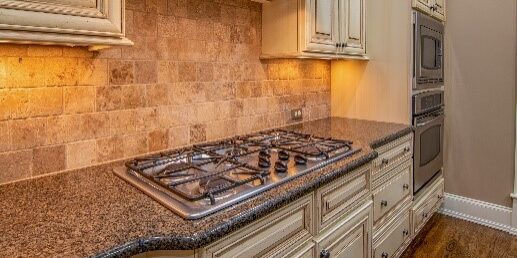How to Quickly Spot Fake Granite

Granite has a long history when it comes to countertop installations. Countertops made of granite have unique styles that boost the entire home’s curb appeal and value. Granite countertop installation requires an expert to avoid mistakes that can damage your kitchen’s design.
Several advantages make granite countertops the best options for homeowners. Durability is a major benefit of granite countertops. It is a hard, natural stone that is resistant to heat damage, stains, and moisture. The natural stone also has a smooth surface that makes its cleaning and maintenance easier.
Counterfeit products are available in almost every market. With many types of granite countertops in the market, it can be challenging to spot fake granite at first. You must be careful when choosing a granite countertop to avoid getting duped.
How to Identify Fake Granite
Here are a few pointers that will help you know that granite is fake.
Color and Pattern
Granite countertops come in a range of colors, most commonly white, black, grey, brown, and beige. Authentic granite countertops appear to have many colors on the surface. The color and pattern of granite countertops should have some natural variations.
Take time to check the surface of the granite countertop you intend to choose. Note that granite should not appear to have a uniform color. Granite countertops without natural variations on their surfaces/slabs are likely to be fake. Avoid granite with unusual colors like bisque, puce, and smalt. Avoid purchasing these colors of granite as well as granite countertops with repeating patterns, as they may very well be fake.
Check Porosity
A water test is necessary if your granite countertop does not have a sealant. Sealing prevents water from getting into the granite and potentially damaging it.
While granite countertops are hard with smooth surfaces, they should not be completely non-porous. Try pouring a few drops of water on your granite countertops to see what happens. Fake granite will make the water run off the slab because of a lack of porosity.
Tap the Granite’s Surface
You should know the sound produced by natural granite when tapped. Real granite produces a ringing sound when tapped. Gently use a spoon to tap a granite countertop.
Fake granite countertops produce click sounds. The click sounds are mostly dull and small. Knowing the sound differences is one of the surest ways of avoiding getting defrauded when choosing a granite countertop.
Consider Professional Granite Countertop Installation
Granite countertop installation is not a task to do on your own. DIY installation will waste your time, money, and probably cause more damage to your kitchen. Look for an experienced, reputable, affordable, and insured expert to install your granite countertops.
At E&B Granite, we have 20 years of experience serving St. Louis and Metro East residents with unique, personalized, and fabricated granite countertops.